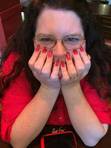Erica Vetsch's Blog, page 59
June 13, 2021
One Thing That Works For Me with guest Cynthia Ruchti: When Considering an Author's Proposal

Good Monday morning, Seeker villagers! How is it already the middle of June? Goodness! Anyway, I (Carrie) am here to introduce today's guest for this month's 'One Thing That Works For Me' series. Please join me in welcoming one of my very favorite people, Cynthia Ruchti, as she shares one thing that works for her when she wears her agent hat :)
ONE THING THAT WORKS FOR ME…when considering an author’s proposal
Having written my own proposals for a bunch of books (many of the more than 36 now in print) and after reviewing a number inching close to a thousand proposals from clients and prospective clients in four-plus years as an agent so far, I can pinpoint the moment when I know “this might work.”Can you guess which of these almost equally important strengths in a book proposal rises above the rest in making me want to dig deeper as an agent?
a. Title
b. Hook
c. Synopsis (fiction) or Chapter Summaries (nonfiction
d. Author Bio
e. Target Audience
f. Reader Takeaway
g. Comparables
h. Marketing Strategies
 Extra whipped cream for your pavlova for those who answered “h.” As valuable as are all the other options, if the marketing strategies section of the proposal catches my eye, in a good way, I’m more likely to consider the project worth further consideration.
Extra whipped cream for your pavlova for those who answered “h.” As valuable as are all the other options, if the marketing strategies section of the proposal catches my eye, in a good way, I’m more likely to consider the project worth further consideration.
Does that sound like backward thinking? (Not the pavlova. What could be wrong with that?) It’s actually forward thinking—a hope-giver for an agent or editor reviewing the proposal. In many ways, it is a reflection of the strength of all the other elements listed.
Many marketing strategies are like obligatory and clumpy powdered sugar when you were expecting whipped cream. Statements like these reveal that the author may be working with an old, tired recipe or is unaware of the power of a true “strategy” for marketing their book.
I’m willing to participate in a world-wide book tour. (Who wouldn’t be? But world-wide—okay, even state-wide book tours—are a thing of the past, for the most part. For all the parts.) I’m willing to do whatever the publisher asks. (Again, a given. If you’re NOT willing to do what the publisher and its marketing team asks, you may not be ready for traditional publishing.)I’m willing to speak to stadiums full of people to talk about my book. (Yeah, so which is actually less realistic—booking space at a stadium or over-filling it with potential readers?)The “I’m willing” parts of those supposed strategies gave away a hard truth. The author isn’t well-informed about the role of the publisher’s marketing team versus the role of the author. It also reveals a misunderstanding about whose books even qualify for a world tour these days. They’re reserved for…well, for… Nope. Can’t think of an author whose publisher jots “world tour” into their marketing budget.
Another list of tell-tale statements from a not-so-swell book proposal:
I plan to get a website. I hope to start a newsletter. I’m fixin’ to work on building a platform this summer as soon as I finish writing the book.A marketing strategy isn’t a place for wishin’, and hopin’, and dreamin’. It’s for did and done. Authors are sometimes wise to hold off submitting their proposal until they have already created an active and engaging website, have a solid base of newsletter subscribers, and have built a platform that can bear the weight of the work it’s required to do.
 What qualifies, then, as a meaningful marketing strategy? As an agent, I appreciate one thing that works when I see it—CREATIVITY. We can’t shut off our creativity and move solely into business mode when putting together a stand-out marketing strategy. Creativity should be the driving force behind what we include in that section of our proposals.
What qualifies, then, as a meaningful marketing strategy? As an agent, I appreciate one thing that works when I see it—CREATIVITY. We can’t shut off our creativity and move solely into business mode when putting together a stand-out marketing strategy. Creativity should be the driving force behind what we include in that section of our proposals. The best marketing strategies are ideas that will make the marketing team at the publishing house lean forward and say, “I wish we’d thought of that!”
They reveal that the author knows his or her audience well, inventing marketing ideas that tap into reader needs and preferences. They show that the author understands how to connect the book’s themes with specific strategies, like a premade list of potential guest blog post topics related to the story or potential online articles that connect the story to current culture. They engage potential readers/purchasers, not just rabid fans…and I use the word rabid loosely.
Those creative ideas have “legs” that reach an untapped audience.
They tie into the reader takeaway of the book (a companion devotional guide about grief, for instance, or a downloadable map of the imaginary island, or a Top Ten list of ways to be kind to a curmudgeon).
 They capitalize on the book’s hook. What giveaways or promotional concepts can emerge from that stunning hook it took a month to create?
They capitalize on the book’s hook. What giveaways or promotional concepts can emerge from that stunning hook it took a month to create? They aim for discoverability and actual book sales. Discoverability alone—informing the public that your book is releasing—is only half the battle. Persuading them to purchase is the end game. (Extra points for those who recognized that as a mixed metaphor disguised as a legit metaphor because a game might well be a battle! I give you Twister and the SuperBowl.)
In a nutshell (see image), a marketing strategy deserves and needs the same level of creativity it took to write your book. Not kidding. It’s definitely one thing that works for me.
(Photos provided by the author via Pixabay)
~*~*~*~*~*~*~
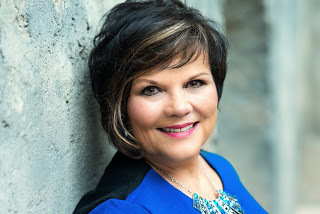 Cynthia Ruchti tells stories hemmed-in-Hope through novels, nonfiction, devotionals, and speaking events for women or writers (or both). Her books have garnered a number of industry awards including reader, retailer, and reviewer honors. She is the professional relations liaison for American Christian Fiction Writers, and serves as a literary agent with Books & Such Literary Management. Her latest release is the novel Facing the Dawn (Revell--a division of Baker Book Group). Watch for this fall's release of the nonfiction Spouse in the House: Rearranging Our Attitudes to Make Room for Each Other (Kregel Publications). You can reach her at https://www.cynthiaruchti.com or hemmedinhope.com
Cynthia Ruchti tells stories hemmed-in-Hope through novels, nonfiction, devotionals, and speaking events for women or writers (or both). Her books have garnered a number of industry awards including reader, retailer, and reviewer honors. She is the professional relations liaison for American Christian Fiction Writers, and serves as a literary agent with Books & Such Literary Management. Her latest release is the novel Facing the Dawn (Revell--a division of Baker Book Group). Watch for this fall's release of the nonfiction Spouse in the House: Rearranging Our Attitudes to Make Room for Each Other (Kregel Publications). You can reach her at https://www.cynthiaruchti.com or hemmedinhope.com
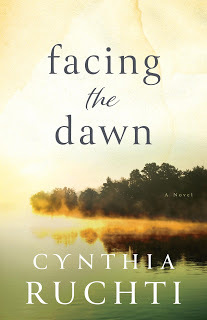
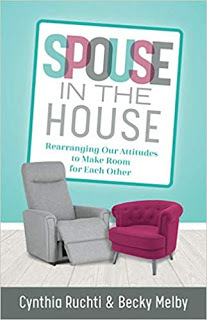
Thank you, Cynthia, for such a great post & valuable insight! What questions do you have for Cynthia about including marketing strategies in your proposal?
June 12, 2021
Sunday Scripture & Prayer Requests
 Christ of the Cornfield, Thomas Francis
Christ of the Cornfield, Thomas Francis
Dicksee, 1883. [PD-US]
Jesus said to the crowds:
“This is how it is with the kingdom of God;
it is as if a man were to scatter seed on the land
and would sleep and rise night and day
and through it all the seed would sprout and grow,
he knows not how.
Of its own accord the land yields fruit,
first the blade, then the ear, then the full grain in the ear.
And when the grain is ripe, he wields the sickle at once,
for the harvest has come.”
He said,
“To what shall we compare the kingdom of God,
or what parable can we use for it?
It is like a mustard seed that, when it is sown in the ground,
is the smallest of all the seeds on the earth.
But once it is sown, it springs up and becomes the largest of plants
and puts forth large branches,
so that the birds of the sky can dwell in its shade.”
With many such parables
he spoke the word to them as they were able to understand it.
Without parables he did not speak to them,
but to his own disciples he explained everything in private.
Mark 4:26-34
The Seekerville bloggers are praying for YOU and for our entire blog community. If you have any special intentions that need additional prayer coverage, leave a request for prayer in the comment section below.
Please join us in praying for our country!God Bless the USA!We are so grateful for all of you—for your friendship and your support!
May the Lord bless you and keep you safe.
June 11, 2021
Weekend Edition
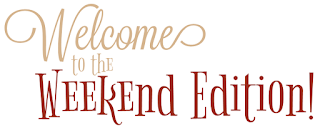
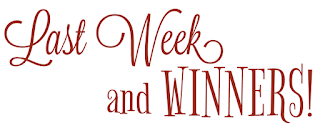
If you are not familiar with our giveaway rules, take a minute to read them here. It keeps us all happy! All winners should send their name, address, and phone number to claim prizes. Please send to Seekerville2@gmail.com. If the winner does not contact us within two weeks, another winner may be selected.
Monday: Winnie talked about Character Arcs - what they are and some tips for making them stand out. Winners of their choice of any book from her backlist are: Kathy Bailey, Glynis, Sandy Smith, Angeline, Vince, Lucy Reynolds and Winnie T.
Wednesday: Ruthy was chatting about author/writer choices, a "woke" society and why labeling isn't always a good thing but she was happy to see Bettie Boswell won a copy of "Prescription for Mystery", Ruthy's latest Guideposts' mystery from the new Miracles and Mysteries of Mercy Hospital series! Congratulations, Bettie!
Friday: Tim Shoemaker shared about "When Life Feels Like Plate-spinning" and hosted a giveaway for his July release, Escape from the Everglades. The winner is Amy A. Congratulations!
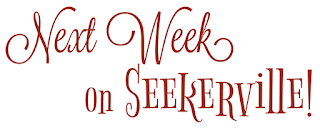
Monday: Cynthia Ruchti will be here to share One Thing That Works for her when considering an author's proposal. You definitely don't want to miss this post!
Wednesday: Cate and Debby switched places this week, so Cate is back with the next book in her popular Favorite Craft Book series. Friday: Mary Connealy is here to explain why It's Hard to Remember to Forget. She's holding a drawing for the FIRST EVER IN THE KNOWN UNIVERSE giveaway of her July Release, A Man with a Past.
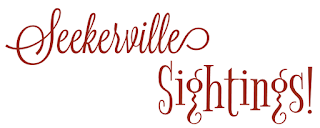
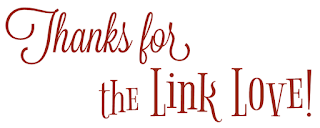
Creating Catharsis: How to Write a Plot That Works by Lewis Jorstad at The Novel Smithy
6 Tips for Using Video Backgrounds in Your Book Memes by LA Sartor at Book Brush Blog
5 Things to Make Your Story Sing by Cindy K Sproles at The Write Conversation
Bridge the Gap Between Where You Are & Where You Want to be In Your Writing Life by Kristen Kieffer at Well-Storied
How to Write a Novel in 9 Simple Steps at Write To Done
4 Ways to Hook Readers on Your Series by Laurence MacNaughton at Fiction University
How to Create a Professional Author Media Kit by Claire Bradshaw at Writers Edit
Organizing Your Writing Space by Lisa Jordan at Learn How To Write A Novel
Monopolize Your Indie Author Real Estate by Penny C Sansevieri at Writers In The Storm
Nods, Smiles, and Frowns: How Can We Avoid "Talking Heads" ... and Cliches? by Jami Gold at Writers Helping Writers
Don't Tease Your Reader. Get to the Tension and Keep it Rising by Joe Ponepinto at Jane Friedman
Habit vs Ritual at Bullet Journal
What I Love About Love by Mandi Blake at Inspy Romance
June 10, 2021
When Life Feels Like Plate-spinning By Tim Shoemaker
I don’t know beans about spinning plates on sticks, and you probably don’t either. You’ve seen plate-performers amaze their audiences, though, right? They actually make plate-spinning look fun—but you and I both know they’re working hard.
Sometimes this writing life is a lot like spinning plates. We’ve got projects, proposals, family, church, jobs, and more . . . all needing our attention. And we don’t always succeed. Sometimes it feels like all we’re doing is walking on broken glass. I’ve noticed that my creativity goes down as my stress goes up. The more I worry about how I’ll get everything done, the less productive I become. Ugh!
The truth is, having more than one project to do—and rotating between them—sometimes raises the quality level of all my work. I stay fresher. More creative.
So how do we pull off this writing-life balancing act? Here are a few things that help me.
Deadline Driven. Every project has a deadline—or I create one. If I’m assigning the date, I leave some decent margin for the unexpected.
 Image from Pixabay
Image from PixabayBreak Down Each Deadline. What steps do I need to take to make that deadline? I map out a route on my calendar.
Stick to My Routines. I roll out of bed and spend the first 15 minutes stretching and exercising. Have breakfast while reading my Bible. Walk two miles. Clean up. That’s my normal workday morning routine. When I deviate because I’m extra busy, I feel “off.” All day. And if I’m off, likely I won’t be as productive.
Dress the Part. I’m a writer. For me, dressing like a professional makes me feel professional too. Clean, comfortable jeans. Nice shirt. I don’t want to get sloppy with any part of my day. Not with how I dress—or how I write.
Some like writing in sweats. They may choose a T-shirt with a neck stretched wide enough to drop a watermelon through. That’s not me. Even COVID never changed that. So much of our writing is impacted by our frame of mind, right?
I dress in a way where I can go work in a public place without being embarrassed if someone recognizes me.
Follow Your Personal Tide Charts, and Navigate Your Day. High tide. Low tide. The water level on our coasts is constantly changing. And for me, there are high and low tide times of my day. Periods when I’m more creative—and less. I want to navigate my day so that a job needing high productivity or creativity is tackled when my energy tide is high.
And I tend to plan out tomorrow when I finish working today. First thing in the morning I have a hard time even picking out a shirt. That isn’t the best time for me to make decisions on how to schedule the day efficiently.
Do the Worst First. Save the Best for Last. If there is a part of a project that I’m dreading or maybe I find it nagging at me when I head to bed at night, I may just schedule that as Job One tomorrow morning. If I procrastinate, it tends to keep tapping me on the shoulder all day. “Hey, remember me? I’m still here.” It’s distracting—and that isn’t good when I’m writing.
I balance this by planning to work on a project that I really want to do later in the day. It becomes an incentive. A reward to get the pesky job done first.
Stay in Your Lane. When I’m driving the expressway, I have a feel for what’s happening in the other lanes, but my focus is on the one I’m in. With writing, I need to stay in my lane. If I’ve dedicated two hours to a particular project, I don’t check my emails while I’m at it. And I tend to keep my desk clear. I’ll only have the materials visible that I need for this project—right now.
We hear how men tend to compartmentalize things. I’ve found this is a really helpful trait when there are lots of projects to do. The more I compartmentalize and focus on just the one thing I need to do right now, the less overwhelmed I’m going to get. I don’t have ten plates to keep spinning. I don’t have ten things on my list to get done. Well, I do, but I only focus on one thing—knowing I’ve blocked out enough time to get the segment done.
 Image from Pixabay
Image from PixabayTake Frequent Breaks. It’s hard to stay focused for long periods of time. I’m better off pushing hard for a bit—resisting the temptation to multi-task. So set a timer. Work for an hour—then take a stretch break before setting the timer again.
Make It Fun. I feel if I’m having fun, it will show in my writing. Readers will know I love what I do.
Work Outside. I made a “standing” desk that I can set up in a wooded spot behind my house—or I can pop it in the car and drive somewhere. The desk breaks down into just three parts, and I can set it up in a few minutes. Now I’m mobile, and I can work anywhere I want.
Fast food restaurants. Driving to a place where I can get a coffee—or a soft drink with a side of fries? It fuels my writing. To me, that’s fun.
Snack time. I’ll almost always have a snack planned. If I’m taking my writing desk to a location, I might have a cooler with me loaded with fun stuff.
What is fun for you? How can you incorporate that into your writing routine?
Picture the Audience. It helps if I think of who will benefit from each project I’m working on. When I’m writing for kids age 12 to 14, I’m not writing for a nameless, faceless group. I’m thinking about people in that target range—or those who will be. So as I was writing Escape From the Everglades, I pictured about how Lily and Caleb and Claire and Miles would love it someday. And Norah and James and Daniel and Grace. Real people that I know. When I imagine their faces as they’re hearing the story for the first time? Well, that’s fuel to keep me going.
Build in Time for Family. I don’t care how busy I get, I’ve always got time for family. I’ve heard other writers talk about locking themselves in their room for three weeks before a deadline. They warn their family not to disturb them for anything less than an emergency. So in essence they’re shutting out the ones they love—to impact people they’ve never met? Something feels off with that approach. Family time keeps me balanced—and staying balanced keeps me productive.
Ask for Help. If you watch any of the plate-spinning videos on YouTube, for example, often the plate spinner isn’t alone. Sometimes there’s a helper. I’ve got two helpers. I share my schedule with my wife. She’s really good at encouraging me along and helping me guard that time. She’s also good at telling me when I’m planning too much. And I pray—especially when the schedule is packed. I need God’s creativity to write well. His help to be efficient. And I’m not too shy to ask for it.
There’s instructional videos on YouTube that teach exactly how to master the art of plate spinning. But the truth is, I don’t have time to learn a circus act. And likely you don’t either. We want to write. Do you have a busy life—lots of projects or family that need your attention? Thank God . . . and remember you can keep everything in balance, with His help.
About the Author
 Tim Shoemaker is the award-winning author of the Code of Silence series and a popular speaker—especially for school assemblies. When he isn’t on the speaking and teaching circuit, he’s busy working with kids and writing more great stories!
Tim Shoemaker is the award-winning author of the Code of Silence series and a popular speaker—especially for school assemblies. When he isn’t on the speaking and teaching circuit, he’s busy working with kids and writing more great stories!He’s the author of eleven books, including Super Husband; Super Dad; Code of Silence; Back Before Dark; Below the Surface; Smashed Tomatoes, Bottle Rockets . . . and Other Outdoor Devotionals You Can Do with Your Kids; Dangerous Devotions for Guys; and more.
He speaks for schools, churches, and parachurch organizations (such as Focus on the Family, Iron Sharpens Iron men’s conferences, International Network of Children’s Ministry, and the Moody Pastors’ Conference). He also speaks at men’s retreats, women’s gatherings, couples’ retreats, youth worker conventions, homeschool conventions, and writers’ conventions, and he conducts family devotion workshops all across the country.
About Escape from the Everglades
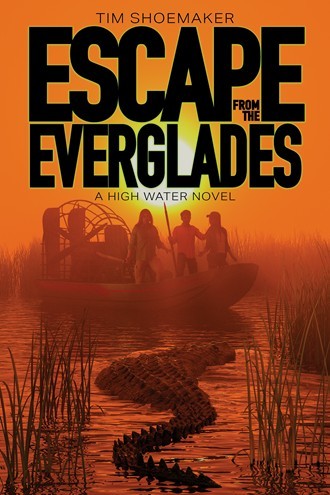
Escape from the Everglades is the first book in the High Water series and blends contemporary mystery and suspense, dramatic situations, and high adventure that both boys and girls will love.
A park ranger’s son hates the Everglades, and he thinks he’ll just die if he doesn't escape Southern Florida soon . . . and he’s right. After Parker Buckman is mauled and nearly killed by an alligator, he sees the glades as a place of death. All he wants to do is get out of the area, and he’s convinced he won’t truly be okay until he does. But he can’t leave until he finds a friend who goes missing.
Escaping a bad situation isn’t a matter of a geographical change. Sometimes the best way to a brighter future is to face the darkness of your past.
GiveawayThank you, Tim for stopping by Seekerville!
Tyndale Publishers is giving away a copy of Escape from the Everglades to one reader today. Just leave a comment below for Tim and you're entered.
(Seekerville's Giveaway rules applied. Open to US residents with a US mailing address only.)
June 8, 2021
Woke or Unwoke? What Does That Mean?
Man, this one is an interesting thing and if you put out an internet search for "Woke" you get everything from Old English to heightened new age awareness. Depending on your point of view, being "woke", having or creating "woke" characters or creating woke stories can be viewed through distinctly different lenses. And I don't mean lenses of color. These lenses are different, and should be used with great care.
Like the rest of you, I hear about folks being "woke", but often your "wokeness" is based on their level of expectation: What the observer likes, wants, believes, embraces, etc. Their life assesses your awareness.
I think, put simply, it's another level of judgment, one person against the other (or "for" the other, if your likes and dislikes align) and it's become an air of anger or indignation on social media.
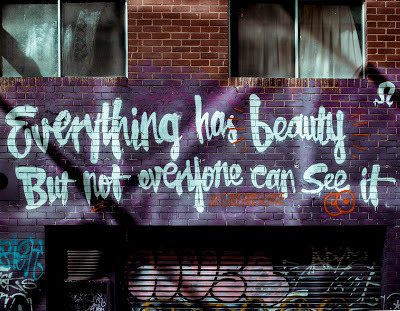
The question for authors is who establishes your "woke" level?
Readers. Readers and sales and reviews and likes vs. dislikes of your work determines what they think of your awareness of the human condition. In the end, being woke doesn't seem to be about awareness anymore... it's about agreement. Sometimes the "fall into line or be quiet" kind of agreement, but how do you translate this into story? How do you stay relevant but respectful? How do you target an audience and show sensitivity to others?

Authors who have never served in the military write military stories. Writers who've never piloted a plane have written pilots as heroes or heroines. Authors who have never been a priest or minister, write about them all the time. Writers who've never been a MAN write men as heroes or protagonists all the time, but in our current times publishers discourage (or refuse) to have authors write outside their color/race/ethnicity. Social media attacks have turned a "woke" society into a battleground where authors have had to change characters the past few years because they're not allowed to write people of color if they're not a person of color.
And then they wonder why so many authors are working in the indie market where great stories are gobbled up by grateful readers. Sometimes following the rules makes sense... but this is one case where it doesn't make sense. A good writer is almost always writing about something he or she doesn't personally know.
You can write murder mysteries and never kill a soul. I mean it! REALLY!!!

You can write about a teacher without an education degree. You can write about a paraplegic, a blind person, an autistic child, a Down Syndrome adult, a veterinarian, a cop, a civil engineer, a midwife, and never have been near anyone who's given birth.
I've been blessed to sell over 2,000,000 books the last eleven years. That's an amazing number! That's a crazy wonderful thing! And depending on who your target audience is, your writing is geared toward that audience. The audience might be broad-based or more narrow. These aren't bad things, this is why publishers and Amazon have so many genres and imprints.
So are you unwoke if you write for a Christian imprint like Love Inspired, Bethany House, Tyndale, Waterfall Press?
Not to those readers. Those readers have the right to pick and choose what they want to read and maybe they pick from multiple genres (so many of us do!) or maybe they stay more narrowly focused (and that's their choice, right)? Targeting a specific audience isn't to disclude others: It's to focus the sales dollars appropriately to a paying public.
I love writing all kinds of characters. My stories are generally women's fiction or romance, and I write with a calling to uplift women. It doesn't matter what color, ethnicity, religion they are... their commonality is being a woman who's had to face strife or trauma or terror.... and writing stories that identify with them.
To me, that's enough. They shouldn't have to be all white because I'm white. That's not the world most of us live in. But I also understand how quickly social media targets and attacks and no publisher wants to be in that particular set of headlights these days. We've all seen what's happened on Twitter and other social media outlets.
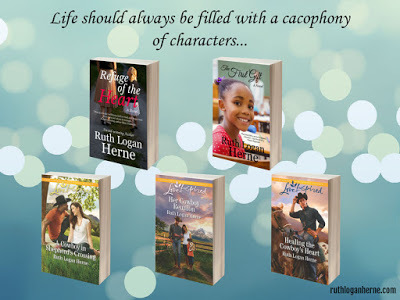
The blessing for authors like me is that I can write books like Refuge of the Heart (A Chechnyan prisoner of war), The First Gift (a biracial child and the white teacher that helps her) a cowboy who falls in love with an interior designer, (see, it doesn't matter what race they are, and I didn't put it into the description because it is of no consequence to the story...) a black supermodel with an eating disorder, a black nanny who steps in when three little rich girls lose their mother, a biracial boy who just wants to be loved, a Latina housekeeper with a secret past... with over 60 books in print, the idea that I can/should only write in my own color spectrum isn't just wrong.
It's silly.
We don't have to be woke to know that writers write... doctors heal... singers sing... Erecting arbitrary lines of demarcation isn't natural... or normal.
Awareness and sensitivity are clutch for any writer in any genre, but there's something about my stubborn Irish nature that sets my hackles on edge when someone says "You can't do this."
Because my first reaction is.... "Hold my beer."
And I don't even drink beer.

Bestselling and multi-published, award-winning author Ruth Logan Herne is kind of a know it all, but she's okay with that and hopes you are, too. With over 60 published novels and novellas and more in the works, Ruthy loves writing the kind of characters the leap off the page and into your heart... Find her on Facebook, stop by her website ruthloganherne.com, drop her an email at loganherne@gmail.com and if you want a really good book to read, you might want to start with her latest Love Inspired "Rebuilding Her Life" or her upcoming mystery from Guideposts "Prescription for Mystery"... available soon from Guideposts.com OR you can win a copy here, today! This is a time-slip mystery that touches the heart... and tends the soul. Leave a comment below to be entered!
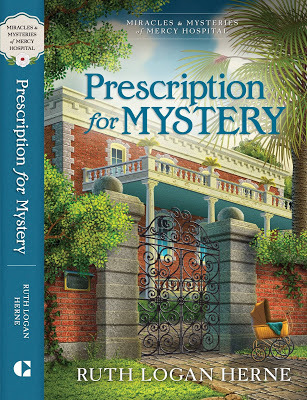
June 7, 2021
Character Arcs

Hello everyone, Winnie Griggs here. Today I'd like to talk about Character Arcs. Let's start off with a few comments about what a Character Arc is so we're all on the same page.
I like to think of a character arc as the evolution of a story character from the person they are at the beginning of the story to who they become by the end of the story. It involves an internal journey that forces them to face obstacles, learn, change and evolve/devolve along the way. This journey can lead to a positive change, a negative change or it can even be, under specific circumstances, a flat line indicating little to no change. And these changes have to with the internal core of a character rather than his physical make-up.

There are several Types of Character Arcs. Here are four of them.
The Positive Arc:
As the name implies, this is an arc where the hero moves from a state of negative outlook to one where they develop a more positive worldview, where they bought into some BIG LIE based on something in their backstory to a state where they can recognize the Lie for what it is and move past it.
For example, Think of Dorothy in the Wizard of Oz. At the beginning of the movie Dorothy is unhappy and wishes to be somewhere else. She believes that if she could find a new place to live (over the rainbow) that her problems would all go away- in other words she is looking for an external solution to an internal problem. Throughout the movie she faces a number of trials and challenges, each making her stronger by small increments and by the end of the movie she has grown to the point that she realizes the secret to happiness was inside her all the time and that she can find happiness wherever she is. And of course she also realizes “there’s no place like home”. Another classic example would be Ebenezer Scrooge who moves from being a parsimonious, uncaring grouch to a man full of good will and charitableness.
The Transformative Arc:
This is a special version of the positive Arc. It’s usually much more dramatic for one thing. Where in a normal positive arc the character grows and overcomes something that has been holding them back, they aren't completely changed – they are a better version of themselves. On the other hand, in a transformative arc, the character starts out as an average person, or even an underdog or wallflower of some type and ends with them as a bigger-than-life hero or savior. This type of arc can most often be found in fantasy or adventure
Examples of this would be Harry Potter, Bilbo Baggins, Luke Skywalker and Mulan
The Negative Arc:
This is, of course, the opposite of the Positive Arc. This would be where the character’s story journey moves them from their current state into something less – morally, mentally, or in some other manner.
A classic example of this is the character of Michael Corleone from The Godfather. At the beginning of the story, Michael is and idealistic young man, an army veteran who married for love. He wants absolutely nothing to do with the “family business”. But the choices he makes over the course of his story journey move him slowly but surely down a dark path until by the end he is the power-hungry, bloodthirsty head of a crime family.
The Static Arc:
This is in effect no arc at all for your character. He is fundamentally the same at the end of the story as he was at the opening. This character has a deep sense of who he is and has strongly held personal values and beliefs and the actions and conflicts of the story don’t impinge on those . He will face and need to overcome many external obstacles but he will not undergo an internal change. In effect, rather than the character himself changing, he is the instrument of change to the world around him. This works in stories that are more about the plot than the character such as some classic whodunnits, and action/thrillers. Examples would be Sherlock Holmes (the original), Mrs. Marple and Jack Sparrow.

So now that we know what a character arc is and some of the most common types, let’s discuss some tips for creating character arcs that keep the readers engaged.
With few exceptions a character should never change all at once. Your change should be the result of numerous small changes over the course of your story.These small changes shouldn’t go smoothly in one direction. Sprinkle in a few setbacks and hiccups along the way for a better sense of realism.Don’t tell your reader that the character is changing. It will resonate more deeply if you show the sometimes subtle, sometimes obvious ways the character is changing in reaction to what’s happening to and around them.Establish clearly at the outset of your story what lie, the false belief, your character is holding tightly to. And then gradually over the course of your story challenge that lie. For example, in Romancing The Stone, Joan Wilder believes she is not as daring and desirable as the heroines she writes about. We don’t have to be told this, within the first ten minutes we see it in a dozen little ways – in the way she dresses, talks, lives and carries herself. But she immediately has to face obstacles-physical, emotional, romantic, moral - that challenge this belief, and these obstacles only escalate throughout the story. By the end of the story we fully buy that she has grown into someone who let go of that lie and emerged as a woman who can face whatever life throws at her.Your character shouldn’t just grow to the point where she can recognize her flaws and weaknesses. She should also be able to overcome them because of what she has learned over the course of the story. And she can only learn these kind of lessons if she played an active part in overcoming the obstacles put in her way, not because she simply realizes she has to change..

In the end, keep in mind that a person doesn’t change without a good reason. To make the character arc believable you must put your character through the wringer, make her face her biggest fears, have her bump up against meaningful, painful problems that she can’t avoid or work around. Do this and you’ll have a story that your reader will remember for a long time to come.

Tell me about a character arc that you think was particularly well done - whether it's from a book, movie or television show - and why you found it so memorable. I'm going to give at least one commenter their choice of any book from my backlist.
June 5, 2021
Sunday Scripture & Prayer Requests
CORPUS CHRISTI
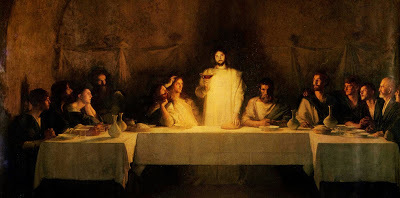 The Last Supper, Bouveret, 19th century. [PD-US]
The Last Supper, Bouveret, 19th century. [PD-US]
On the first day of the Feast of Unleavened Bread,
when they sacrificed the Passover lamb,
Jesus’ disciples said to him,
"Where do you want us to go
and prepare for you to eat the Passover?"
He sent two of his disciples and said to them,
"Go into the city and a man will meet you,
carrying a jar of water.
Follow him.
Wherever he enters, say to the master of the house,
'The Teacher says, "Where is my guest room
where I may eat the Passover with my disciples?"'
Then he will show you a large upper room furnished and ready.
Make the preparations for us there."
The disciples then went off, entered the city,
and found it just as he had told them;
and they prepared the Passover.
While they were eating,
he took bread, said the blessing,
broke it, gave it to them, and said,
"Take it; this is my body."
Then he took a cup, gave thanks, and gave it to them,
and they all drank from it.
He said to them,
"This is my blood of the covenant,
which will be shed for many.
Amen, I say to you,
I shall not drink again the fruit of the vine
until the day when I drink it new in the kingdom of God."
Then, after singing a hymn,
they went out to the Mount of Olives.
Mk 14:12-16, 22-26
The Seekerville bloggers are praying for YOU and for our entire blog community. If you have any special intentions that need additional prayer coverage, leave a request for prayer in the comment section below.
Please join us in praying for our country!God Bless the USA!We are so grateful for all of you—for your friendship and your support!
May the Lord bless you and keep you safe.
June 4, 2021
Weekend Edition


If you are not familiar with our giveaway rules, take a minute to read them here. It keeps us all happy! All winners should send their name, address, and phone number to claim prizes. Please send to Seekerville2@gmail.com. If the winner does not contact us within two weeks, another winner may be selected.
Monday: Memorial Day - Seekerville Closed
Wednesday: Mindy Obenhaus offered insights into the world of writer-on-deadline craziness along with gentle suggestions to help keep your sanity through the process.
Friday:

Monday: Winnie is up and she'll be discussing Character ARCs (and there may just be a giveaway or 2)
Wednesday: Ruth Friday: Tim Shoemaker talks about "When Life Feels Like Plate-spinning" and a giveaway for his July release!


20 Amazing Mock Up Templates for Your Historical Romance Book by LA Sartor at Book Brush Blog
What's Your Body Language IQ? by Margie Lawson at Writers In The Storm
When the Sparkle is Missing From Your Writing by Blythe Daniel at BRMCWC
Where Do Your Readers Come From? by Carla Laureano at Steve Laube Agency
The Anonymous Road by Christina Delay at Writers Helping Writers
What To Do Once You've Finished Your First Draft by Heidi McCahan at Learn How To Write A Novel
What Book Editors Will and Won't Do For You by Hannah Bauman at Between The Lines Editorial
PreWriting Rituals by Lynn H Blackburn at The Write Conversation
5 Tips for Writing a Novella That Wows Readers by Sarah Skilton at Fiction University
Simple Time Management at The Bullet Journal
Plot Twist Story Prompts by Robert Lee Brewer at Writers Digest
OPEN CRITIQUE DAY!!!!!
GOOD MORNING!
For those of you who are new, today is a day when you can post a small part of your work, an opening or a page or two and (GULP!) we'll tell you what we think!
Feel free to give us a little explanation in your comment.... but it's okay if you don't do that, too. Sometimes writers feel the need to over-explain!
We're all on deadlines so we'll be back and forth today... and this is Ruthy, we're planting on the farm, so if you have to wait a little bit, that's okay... have some tea. Grab some coffee, eat a doughnut...
IT IS NATIONAL DOUGHNUT DAY!!!! Also spelled NATIONAL DONUT DAY!!!!!!
:)
We're looking forward to seeing what you've got!
June 1, 2021
A Writer's Well Being: Step Away from the Candy (Revisit)
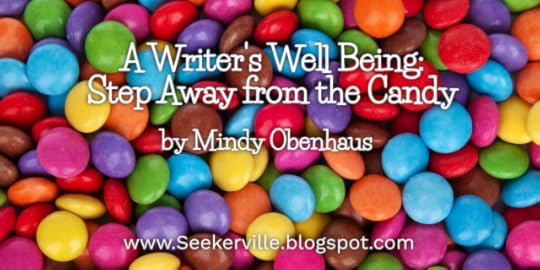
by Mindy Obenhaus
A writer on deadline can be a scary sight. The red-rimmed eyes from lack of sleep (or crying out a scene), crazed hair from jamming their fingers through it repeatedly, all while wearing the ever popular t-shirt and pajama bottoms.
Okay, so we don't all look that way.However, when a writer is on deadline, they often overlook life as it normally exists and descend into a pit of unhealthy habits.
So what's a writer to do?
Look out for number one. How can you give your best when you're not your best?
Here are a few tips to help you care for your #1 -Plan ahead - Deadlines rarely show up out of the blue. So before crunch time hits, make a plan. Take care of all those errands you've been putting off. Get the oil changed, schedule the kids physicals/haircuts/dental appointments, make that big trip to the grocery store. Stock up on healthy snacks (we'll talk more about those below), easy-to-prepare meal items and toilet paper. Because let's face it, no one wants to have to take time away from their hectic writing schedule to run to the store for toilet paper. Plan your meals in advance. If you're making a casserole, make two and freeze the second one. Then, when time is of the essence, all you have to do is pop it in the oven and continue writing.
 Get up and move - My office happens to be on the opposite end of the house from the kitchen. I'm a big tea drinker and while I contemplated keeping my electric kettle in my office, I ultimately decided the walk to the kitchen would be a better idea.
Get up and move - My office happens to be on the opposite end of the house from the kitchen. I'm a big tea drinker and while I contemplated keeping my electric kettle in my office, I ultimately decided the walk to the kitchen would be a better idea.Writing is a sedentary job, so we need to force ourselves to move so our performance at the computer will be at its best. If possible, wake up 30 minutes early to get in some exercise and get your blood pumping before you put your butt in the chair. If you're stuck on a scene, take a walk outside to clear your head. Schedule a break once an hour and do some jumping jacks. Or, simply walk to the other end of the house for another cup of tea.
 Eat healthy - When we're stressed, it's easy to reach for things that aren't necessarily good for us. We keep a bowl of peanut M&Ms on our desk. "It's a reward for every so many words," we tell ourselves. And that "peanuts have protein, so they're good for us." Ah, if only peanut M&Ms fell into the healthy category. I'd eat them day and night.
Eat healthy - When we're stressed, it's easy to reach for things that aren't necessarily good for us. We keep a bowl of peanut M&Ms on our desk. "It's a reward for every so many words," we tell ourselves. And that "peanuts have protein, so they're good for us." Ah, if only peanut M&Ms fell into the healthy category. I'd eat them day and night.Even when you're on deadline, you need to eat real meals, preferably somewhere away from your computer. Trust me, the change of scenery will do you good. And as for those snacks, instead of candy, try reaching for just the peanuts or whatever your favorite variety of nut may be. Or, if you really need something sweet, try mixing those nuts with some dried fruit. Cheese sticks are a good protein boost, as is yogurt (look for high-protein varieties), even beef jerky. Apples and berries will satisfy your sweet tooth without spiking your blood sugar.
 Sleep - A good night's sleep is necessary to keep our brains and bodies performing at their best. However, that can sometimes be a challenge when you're on deadline because you're constantly thinking about the story. You wake up at 2 a.m. with an idea and, bang, you're wide awake. Instead of lying there wide awake or getting up and stumbling to your computer, try keeping a pen and paper beside your bed. When those ideas crop up in the middle of the night, write them down, then roll over, knowing that you won't forget that stellar plot twist because you've made note of it. Or, if you don't want to turn the light on for pen and paper, type your thoughts on your phone. If you're like me, it's charging on the nightstand anyway.
Sleep - A good night's sleep is necessary to keep our brains and bodies performing at their best. However, that can sometimes be a challenge when you're on deadline because you're constantly thinking about the story. You wake up at 2 a.m. with an idea and, bang, you're wide awake. Instead of lying there wide awake or getting up and stumbling to your computer, try keeping a pen and paper beside your bed. When those ideas crop up in the middle of the night, write them down, then roll over, knowing that you won't forget that stellar plot twist because you've made note of it. Or, if you don't want to turn the light on for pen and paper, type your thoughts on your phone. If you're like me, it's charging on the nightstand anyway.Reward yourself - At the end of your writing day, do something you enjoy. Watch your favorite TV show, read a book, play with the kids/grandkids, plot your next book, whatever brings you joy. And don't feel guilty. Remember, you've earned it.
 Keep God in the equation - Psalm 121:1-2 "I lift up my eyes to the mountains - where does my help come from? My help comes from the Lord, the Maker of Heaven and earth." Talk to Him, allow Him to guide through whatever you're doing.When you take care of you, not only are you happier, your family is happier and your readers will love you.
Keep God in the equation - Psalm 121:1-2 "I lift up my eyes to the mountains - where does my help come from? My help comes from the Lord, the Maker of Heaven and earth." Talk to Him, allow Him to guide through whatever you're doing.When you take care of you, not only are you happier, your family is happier and your readers will love you. So reader or writer, let's chat about what keeps you sane during those times when life gets crazy. Do you plan ahead and try to take care of yourself? Or do you roll with the punches? What are some your favorite ways to stay on task?
 Award-winning author Mindy Obenhaus is passionate about touching readers with Biblical truths in an entertaining, and sometimes adventurous, manner. She lives on a ranch in Texas with her husband, two sassy pups, countless cattle, deer and the occasional coyote, mountain lion or snake. When she's not writing, she enjoys spending time with her grandchildren, cooking and watching copious amounts of the Hallmark Channel. Learn more at www.MindyObenhaus.com
Award-winning author Mindy Obenhaus is passionate about touching readers with Biblical truths in an entertaining, and sometimes adventurous, manner. She lives on a ranch in Texas with her husband, two sassy pups, countless cattle, deer and the occasional coyote, mountain lion or snake. When she's not writing, she enjoys spending time with her grandchildren, cooking and watching copious amounts of the Hallmark Channel. Learn more at www.MindyObenhaus.com

